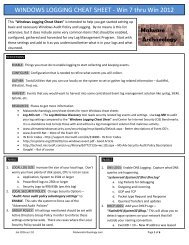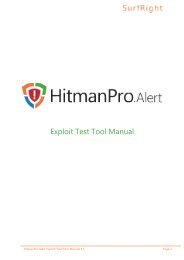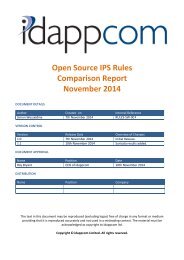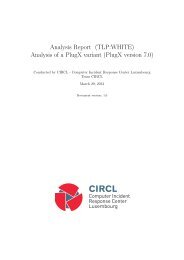The use of the Internet
The use of the Internet
The use of the Internet
You also want an ePaper? Increase the reach of your titles
YUMPU automatically turns print PDFs into web optimized ePapers that Google loves.
CHAPTER III. POlICy AND lEGISlATIvE FRAMEwORKS<br />
On <strong>the</strong> facts <strong>of</strong> <strong>the</strong> case, noting that it raised difficult questions <strong>of</strong> interpretation about <strong>the</strong><br />
scope <strong>of</strong> application <strong>of</strong> section 57, <strong>the</strong> Court held that <strong>the</strong> necessary connection was not<br />
present, and <strong>the</strong>refore <strong>the</strong> resulting convictions were unsound, and allowed <strong>the</strong> appeals.<br />
99. Section 58 <strong>of</strong> <strong>the</strong> Act has proven particularly <strong>use</strong>ful in several cases in which<br />
authorities have needed to intervene when <strong>the</strong>re was no evidence that <strong>the</strong> individual<br />
was engaged in activity associated with terrorism. <strong>The</strong> section makes it an <strong>of</strong>fence to<br />
collect, make or have in one’s possession, without a reasonable exc<strong>use</strong>, any record <strong>of</strong><br />
information <strong>of</strong> a kind likely to be <strong>use</strong>ful to a person committing or preparing an act<br />
<strong>of</strong> terrorism or to have possession <strong>of</strong> any document or record containing such<br />
information.<br />
100. In R v. K [2008] 3 All E.R. 526, <strong>the</strong> Court held that a document falls within<br />
<strong>the</strong> scope <strong>of</strong> section 58 only if it is <strong>of</strong> a kind that is likely to provide practical assistance<br />
to a person committing or preparing to commit an act <strong>of</strong> terrorism. This approach was<br />
reaffirmed in R v. G and J [2009] UKHL 13, in which <strong>the</strong> Court reaffirmed this<br />
“practical <strong>use</strong> test”, under which possession <strong>of</strong> a document or record is a crime only<br />
if it is <strong>of</strong> practical <strong>use</strong> and was possessed by a person without a reasonable exc<strong>use</strong>. 85<br />
<strong>The</strong>re is no restriction on what might constitute a reasonable exc<strong>use</strong> for this purpose,<br />
provided that it is capable in law <strong>of</strong> amounting to a defence.<br />
101. Under section 58, <strong>the</strong> prosecution is not required to prove that <strong>the</strong> acc<strong>use</strong>d is<br />
a terrorist or that any items are possessed for a terrorist purpose; however, <strong>the</strong> prosecution<br />
may only in very limited circumstances call extrinsic evidence to prove <strong>the</strong> practical<br />
utility <strong>of</strong> any item. For example, evidence <strong>of</strong> cipher may be called in order to decipher<br />
a document written in code, but no evidence may be called to explain <strong>the</strong> significance<br />
<strong>of</strong> locations circled on a map. <strong>The</strong> information must “speak for itself” and not be <strong>of</strong><br />
a type in general circulation.<br />
102. In R v. Sultan Mohammed [2010] EWCA Crim 227, <strong>the</strong> court held that<br />
“[p] rovided that <strong>the</strong> document containing <strong>the</strong> information is not one in every day <strong>use</strong><br />
by ordinary members <strong>of</strong> <strong>the</strong> public (e.g. published timetables and maps) and provided<br />
that a reasonable jury could properly conclude that <strong>the</strong> document contains information<br />
<strong>of</strong> a kind likely to be <strong>use</strong>ful to a person committing or preparing an act <strong>of</strong> terrorism,<br />
<strong>the</strong>n it will be a matter for <strong>the</strong> jury whe<strong>the</strong>r <strong>the</strong>y are sure that it contains such<br />
information. If so, and provided <strong>the</strong> defendant has <strong>the</strong> necessary mens rea, <strong>the</strong>n <strong>the</strong><br />
only issue will be whe<strong>the</strong>r <strong>the</strong> defendant has a reasonable exc<strong>use</strong>.” 86 <strong>The</strong> jury must<br />
accordingly decide whe<strong>the</strong>r <strong>the</strong> explanation given for possessing <strong>the</strong> document is in fact<br />
reasonable given <strong>the</strong> particular facts and circumstances <strong>of</strong> <strong>the</strong> case. 87<br />
85 Ibid., p. 962.<br />
86 Quotation from “R. v. Muhammed [2010] EWCA Crim 227: terrorism—preparing an act <strong>of</strong> terrorism”, Criminal<br />
Law and Justice Weekly (20 March 2010).<br />
87 Hemming, “<strong>The</strong> practical application <strong>of</strong> counter-terrorism legislation in England and Wales”, p. 963.<br />
33







